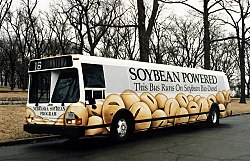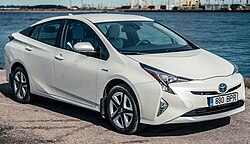Alternative fuel vehicle
Alternative fuel vehicles are vehicles that use energy that comes from something other than petroleum (oil). (Gasoline and diesel fuel come from petroleum[1][2]). Most of the alternative energy does not need to be imported from other countries, so money stays in the country. Some (but not all) come from renewable sources. Many produce less pollution than gasoline or diesel.[3]
Alternative fuel vehicles cover a wide range of engines and motors.
- Electric vehicle - no pollution from the car, but there can be some pollution where the electricity is made
- Natural gas vehicle - a fossil fuel, but burns much cleaner than gasoline, and there is more natural gas available than petroleum
- Biodiesel vehicle - diesel fuel that comes from plant (or sometimes animal) oils
- Ethanol vehicle - quite often ethanol is mixed with gasoline, from 10% to 85% ethanol (called E10 or E85)
- Methanol vehicle - Methanol and ethanol are used in many of the fastest race cars
- Butanol vehicle - similar to ethanol and methanol, this can be made from many biofuels, but is not commonly used
- Hydrogen car - also called a fuel cell vehicle, or FCV
- Compressed air vehicle - this technology works, but vehicles are still in the demonstration stage, and range can be a problem
- Propane (or liquefied petroleum gas, LPG)
Also, there are bicycles, rickshaws, and two and three-wheeled human powered vehicles.
Alternative Fuel Vehicle Media
US E85FlexFuel Chevrolet Impala LT 2009
The Nissan Leaf was the world's top selling highway-capable all-electric car until December 2019.
The Mitsubishi Outlander P-HEV is the world's all-time best selling plug-in hybrid with 270,000 units sold through December 2020.
The Brazilian Fiat Siena Tetrafuel 1.4, the first multifuel car that runs as a flexible-fuel on pure gasoline, or E25, or E100; or runs as a bi-fuel with natural gas (CNG).
The Toyota Prius is the world's best-selling hybrid electric vehicle, with global sales of almost 4 million units through January 2017.
Other websites
- Alternative Fuels Development Center (U.S. Department of Energy)
References
- ↑ Joanna Kakissis (July 26, 201). "U.K. To Ban Diesel And Gas Cars In 2040". NPR. Retrieved 27 July 2017.
- ↑ Angelique Chrisafis and Adam Vaughan (6 July 2017). "France to ban sales of petrol and diesel cars by 2040". The Guardian. Retrieved 27 July 2017.
- ↑ "Alternative Fuels". U.S. Dept of Energy. Retrieved 27 March 2013.









